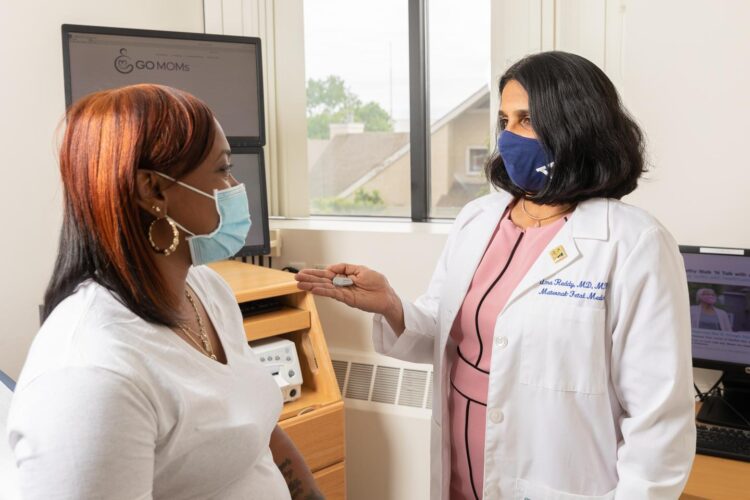Nationwide study aims to recruit people in the first trimester of pregnancy
A new study supported by the National Institutes of Health aims to improve gestational diabetes screening and diagnosis by better understanding blood glucose levels throughout pregnancy. Gestational diabetes is usually diagnosed between the 24th and 28th week of pregnancy, which may be too late to counteract some long-lasting harm to the pregnant person and child.
During pregnancy there are changes in glucose metabolism–the way glucose, often called blood sugar, is used in the body–to meet the needs of the developing fetus, but the details of these changes are unknown. With sites around the country, the Glycemic Observation and Metabolic Outcomes in Mothers and Offspring study, or GO MOMs, aims to fill in these knowledge gaps. The study will enroll about 2,150 people without diabetes and in their first trimester of pregnancy. Funded by NIH’s National Institute of Diabetes and Digestive and Kidney Diseases, GO MOMs will use continuous glucose monitoring technology to map blood glucose levels throughout pregnancy.
“GO MOMs will set the foundation for determining future approaches to the screening, diagnosis, and eventually the treatment of elevated blood glucose during pregnancy,” said NIDDK program director Dr. Barbara Linder, the project scientist for the study. “By understanding more about glucose levels during pregnancy, we can identify potential early indicators of gestational diabetes and pinpoint the best times to screen for and treat it.”
GO MOMs builds on a previous NIH-funded landmark study of hyperglycemia and adverse pregnancy outcomes and its follow-up, HAPO and HAPO-FUS, which found that people with elevated blood glucose during pregnancy – even if not high enough to meet the definition of gestational diabetes – are significantly more likely to develop type 2 diabetes or prediabetes years after pregnancy than their counterparts without elevated blood glucose.
In addition, HAPO-FUS demonstrated that children born to people with elevated blood glucose during pregnancy were more likely to have obesity and impaired glucose metabolism a decade later. The effects in children, called metabolic imprinting, are thought to occur much earlier during pregnancy than when gestational diabetes is currently screened.
The data collected from GO MOMs will help determine timing and approach for future clinical trials to understand when and how to screen for and treat elevated blood glucose in pregnancy, and if this treatment will have any effect on children years later.
“By the time people are currently screened for gestational diabetes, it could be too late to avoid the long-lasting health effects,” said Dr. William Lowe, professor of medicine at Northwestern University Feinberg School of Medicine, Chicago, and study chair for GO MOMs. “We hope to recruit a diverse group of GO MOMs participants to help pinpoint key changes during pregnancy and see if there are associations with a subsequent gestational diabetes diagnosis and large size at birth for the offspring.”
Northwestern University is the study’s coordinating center and a study site. Other study locations include:
- Columbia University, New York
- Kaiser Center for Health Research, Honolulu
- Kaiser Center for Health Research NW, Portland, Oregon
- Magee Women’s Hospital, Pittsburgh
- Massachusetts General Hospital, Boston
- Tufts Medical Center, Boston
- Women and Infants Hospital of Rhode Island, Providence
- Yale University, New Haven, Connecticut
“GO MOMs will provide precise insight into glucose changes during pregnancy, informing future innovations in diabetes prevention,” said NIDDK Director Dr. Griffin P. Rodgers. “This study sets the stage for healthier generations to come.”
###
The study is open now for people in their first trimester of pregnancy without diabetes and willing to use a continuous glucose monitoring device for 10 days at four times during their pregnancy. To learn more and enroll, http://www.
The Clinicaltrials.gov identifier for this study is NCT04860336.GO MOMs is funded by the NIDDK through grants U01DK123745, U01DK123759, U01DK123783, U01DK123791, U01DK123795, U01DK123799. Dexcom is providing the continuous glucose monitors.
The NIDDK, a component of the NIH, conducts and supports research on diabetes and other endocrine and metabolic diseases; digestive diseases, nutrition and obesity; and kidney, urologic and hematologic diseases. Spanning the full spectrum of medicine and afflicting people of all ages and ethnic groups, these diseases encompass some of the most common, severe and disabling conditions affecting Americans. For more information about the NIDDK and its programs, see http://www.
About the National Institutes of Health (NIH): NIH, the nation’s medical research agency, includes 27 Institutes and Centers and is a component of the U.S. Department of Health and Human Services. NIH is the primary federal agency conducting and supporting basic, clinical, and translational medical research, and is investigating the causes, treatments, and cures for both common and rare diseases. For more information about NIH and its programs, visit http://www.
Media Contact
Heather Martin
[email protected]
Original Source
https:/





